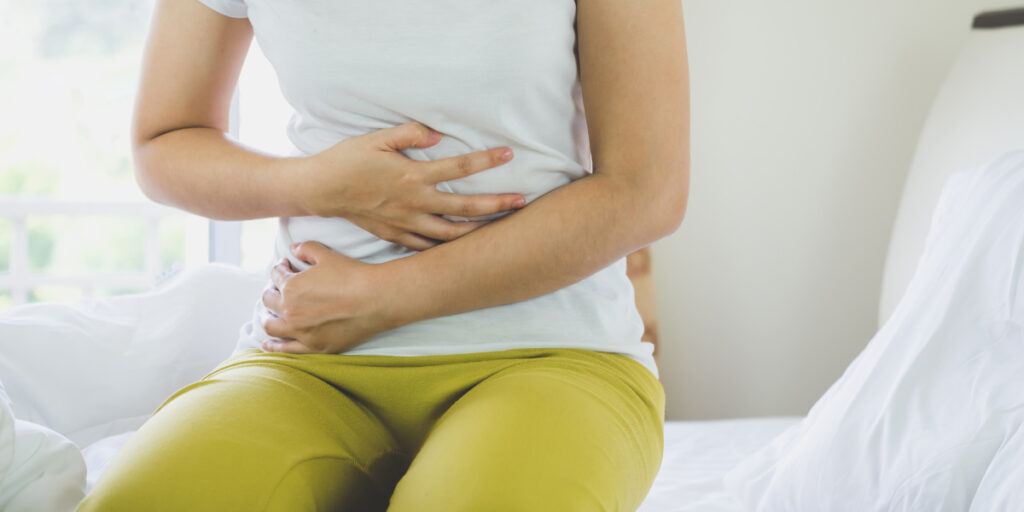
A heavy period, clinically referred to as heavy menstrual bleeding or menorrhagia, is characterized by a flow so heavy that you have to change your tampon or pad every hour for at least a whole day.1 Heavy periods can also be defined as a period that lasts longer than seven days.2 It is typically accompanied by severe menstrual cramps that keep you from your normal activities.3 Together, excessive menstrual bleeding and debilitating cramps result in a significantly reduced quality of life for as many as 1 in 5 women.4
Heavy periods are mainly caused by hormone imbalances and/or problems with the uterus, but can also be brought on by bleeding disorders or diseases of the thyroid, kidneys, and liver.5
The hormones responsible for heavy periods include estrogen and progesterone (female sex hormones), as well as other hormones that interact with them. Imbalances in any of these hormones can lead to a heavy period.
Heavy periods can also be caused by problems with the uterus, such as cancer, fibroids, polyps, endometriosis, adenomyosis, pelvic inflammatory disease (PID), pregnancy complications, non-hormonal intrauterine devices (IUDs), and certain anti-inflammatory and anticoagulant medications.6
How heavy periods affect women’s lives
Heavy periods affect nearly every aspect of a woman’s life, preventing her from carrying out her daily activities, going to work, and spending time with friends and family. Although rarely life-threatening, it can significantly affect a woman’s quality of life and lead to serious mental health conditions like anxiety and depression.7
If left untreated, heavy periods can cause blood loss anemia, a condition where there are not enough circulating red blood cells to carry oxygen to tissues.8 As a result, your body uses iron stores to help the remaining red blood cells carry more oxygen.9 Symptoms of anemia are fatigue, pale or yellowish skin, irregular heartbeats, dizziness, chest pain, cold hands and feet, and headaches.10
What solutions are out there to treat it?
Women experiencing heavy periods have several treatment options.
Conservative therapies include non-steroidal anti-inflammatory drugs (NSAIDs), birth control, hormone therapy, and diet changes.11
If these treatments prove to be ineffective, then an OBGYN may recommend surgical treatment. An endometrial ablation is a minimally invasive procedure that involves destroying (ablating) the lining of the uterus (endometrium), which houses the tissue that bleeds during menstruation.12 Alternatively, a hysterectomy is a surgical procedure that removes the uterus and other reproductive organs if needed.13 Although a hysterectomy provides permanent and immediate relief from heavy periods, an endometrial ablation has a shorter recovery time and a lower risk of complications.14
How the Cerene® Cryotherapy Device can help
The Cerene Cryotherapy Device is an FDA-approved technology for endometrial cryoablation, an ablation technique that gynecologists use to freeze and destroy the lining of the uterus.15 Cerene has been clinically proven to significantly reduce heavy bleeding and cramping, and most patients return to their daily activities within 24 hours of treatment.
Cerene is a safe and well-tolerated procedure that can be comfortably performed in your doctor’s office. The treatment does not require sedation, as the freezing temperatures (cryotherapy) provide a natural pain relieving, or numbing, effect.16
One year following treatment with Cerene, 90% of patients had normal, light or no periods and 86% reported a reduction in cramping†. A recent study concluded that patients treated with Cerene were still experiencing relief three years after the procedure.17
The Cerene treatment has a high patient satisfaction rate, with 95% stating that they would recommend Cerene to family and friends*.
Find out how Cerene can help you get your life back from heavy periods.
Learn more at https://www.cerene.com/patients/.
† Improvement reported one year after treatment for patients reporting severe/very severe cramping
*Patient-reported data include definitely and consider recommending Cerene and are 1 year after treatment with durable results at 3 years
Important Safety Information
Cerene® Cryotherapy Device is indicated to ablate the endometrial lining of the uterus in premenopausal women with heavy menstrual bleeding due to benign causes for whom childbearing is complete. Pregnancy following the Cerene procedure can be dangerous; therefore, contraception must be used until menopause. The Cerene procedure is not for those who have or suspect uterine cancer; have an active genital, urinary or pelvic infection; or an IUD. There are risks and considerations associated with the use of the Cerene Cryotherapy Device. Temporary side effects may include uterine cramping, vaginal infection, and lightheadedness. For detailed benefit and risk information, consult the Cerene Instructions for Use (IFU) or your healthcare professional. Learn more >
Sources:
Important Safety Information
Cerene® Cryotherapy Device is indicated to ablate the endometrial lining of the uterus in premenopausal women with heavy menstrual bleeding due to benign causes for whom childbearing is complete. Pregnancy following the Cerene procedure can be dangerous; therefore, contraception must be used until menopause. The Cerene procedure is not for those who have or suspect uterine cancer; have an active genital, urinary or pelvic infection; or an IUD. As with all surgical procedures, there are risks and considerations associated with the use of the Cerene Cryotherapy Device. Temporary side effects may include cramping, nausea, vomiting, vaginal discharge and spotting. For detailed benefit and risk information, consult the Cerene Instructions for use (IFU) or your healthcare professional. Learn More
